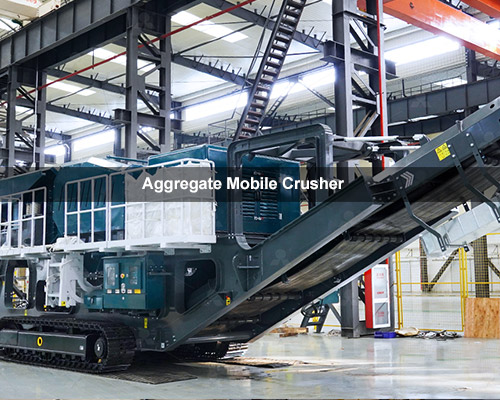Aggregate Mobile Crusher Cost
Aggregate mobile crusher is essential equipment in construction, mining, and recycling industries, offering flexibility and efficiency in processing materials on-site. However, understanding the total cost of owning and operating a mobile crusher is crucial for making informed investment decisions. In this article, we’ll break down the factors that influence aggregate mobile crusher cost, provide insights into pricing, and share practical tips to optimize your expenses.
What Is an Aggregate Mobile Crusher?
An aggregate mobile crusher is a portable machine designed to crush rocks, concrete, and other materials into smaller, reusable aggregates. Unlike stationary crusher, mobile units can be transported to different job sites, reducing transportation costs and increasing operational efficiency. They are commonly used in road construction, quarrying, and demolition projects.
Factors Influencing Aggregate Mobile Crusher Cost
The cost of an aggregate mobile crusher varies widely based on several key factors. Here are the main components to consider:
- Purchase Price: The initial cost ranges from $50,000 to $500,000 or more, depending on the crusher type (e.g., jaw crusher, impact crusher), capacity, and brand. High-capacity models with advanced features tend to be more expensive.
- Operating Costs: These include fuel, electricity, and labor expenses. Mobile crusher consume significant energy, so fuel efficiency can impact long-term costs. Labor costs depend on the number of operators required.
- Maintenance and Repairs: Regular servicing, part replacements (e.g., wear parts like liners and hammers), and unexpected repairs add to the overall cost. Proper maintenance can extend the equipment’s lifespan and reduce downtime.
- Transportation and Setup: Moving the crusher between sites involves logistics costs, such as trucking and permits. Some models are easier to transport, which can save money.
- Technology and Features: Advanced features like automation, remote control, and dust suppression systems may increase the initial cost but improve efficiency and compliance with regulations.
- Market Conditions: Factors like supply chain issues, demand fluctuations, and geographic location can affect pricing. For example, costs might be higher in remote areas.
How to Calculate Total Cost of Ownership
To get a realistic estimate of aggregate mobile crusher cost, consider the total cost of ownership (TCO), which includes:
- Initial purchase price
- Operating expenses (fuel, labor, etc.)
- Maintenance and repair costs over the equipment’s lifespan
- Depreciation and resale value
- Financing costs if you’re taking a loan
On average, TCO for a mid-range mobile crusher can range from $100,000 to $1 million over 5-10 years, depending on usage. It’s advisable to request quotes from multiple suppliers and compare TCO rather than just the sticker price.
Tips to Reduce Aggregate Mobile Crusher Cost
Here are some practical ways to minimize expenses without compromising performance:
- Choose the Right Size and Type: Select a crusher that matches your project needs to avoid overpaying for excess capacity. For instance, smaller projects might benefit from a compact model.
- Consider Used or Rental Options: Purchasing a used mobile crusher or renting one for short-term projects can significantly lower costs. Ensure used equipment is inspected for condition.
- Optimize Operations: Train operators to use the crusher efficiently, reducing fuel consumption and wear. Regular maintenance schedules can prevent costly breakdowns.
- Compare Suppliers: Research reputable brands and negotiate prices. Look for warranties and after-sales support to avoid hidden costs.
- Focus on Energy Efficiency: Newer models often have better fuel economy, which can save money in the long run. Also, consider solar or hybrid options if available.
Conclusion
Understanding the aggregate mobile crusher cost is essential for budgeting and maximizing return on investment. By factoring in purchase price, operating expenses, maintenance, and other variables, you can make a smart decision that aligns with your project goals. Whether you’re in construction or recycling, evaluating total cost of ownership and implementing cost-saving strategies will help you achieve efficiency and profitability. For more information, consult with industry experts or request customized quotes from trusted suppliers.
By focusing on these aspects, you can navigate the complexities of mobile crusher costs and find a solution that fits your budget and operational needs.

